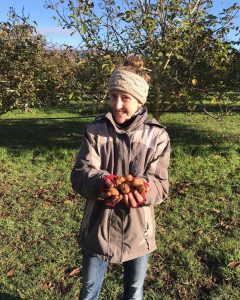 Walnuts will grow in a reasonably wide range of climates, but like avocados the cooler climate of Tasmania results in a slower-growing, and thus better-tasting, end-result. The best-tasting Tasmanian walnuts – i.e. the best of the best – are the Chandler and Franquette varieties grown by Coaldale walnuts, and this year’s crop are finally ready to share with you!
Walnuts will grow in a reasonably wide range of climates, but like avocados the cooler climate of Tasmania results in a slower-growing, and thus better-tasting, end-result. The best-tasting Tasmanian walnuts – i.e. the best of the best – are the Chandler and Franquette varieties grown by Coaldale walnuts, and this year’s crop are finally ready to share with you!
I like to visit all our growers to get a better idea of what they do and how they do it, and this week I headed out to Coaldale walnuts, which is a short drive out of Richmond, to pick up a heap of delicious walnuts and have a tour of the farm. We’ve been buying nuts from Phil and Jane for quite a few years, but the first plantings on the site go back 25 years – although actual nut harvests don’t go back quite that far as it takes walnuts five or so years to become established and “fruit”. Phil & Jane’s daughter Sophie (and her husband Brad) have now bought the farm, but her parents continue to be actively involved in running it, and have a lot of hard-won wisdom to share!
Whilst in principle it sounds simple just gathering nuts that fall from trees, growing walnuts commercially is a fairly involved process. Sheep from a neighbour’s property keep the grass short around the trees, which is important to avoid the fallen nuts getting too damp, and also to facilitate the operation of the nut harvester, which using a roller with slightly flexible fingers methodically picks up all the nuts from the ground without cracking the shells. The nuts are washed, then dried in large drying vats before being sorted for size and quality – the larger nuts are sold in-shell, but the smaller nuts are generally cracked and the kernels vacuum packed, although as the shelf-life of cracked nuts is shorter they are kept in shell and cracked to order. Anything that is already cracked and unsuitable for storage is sold as bird feed, and the cracked shells from the shelled nuts are used as mulch on the grove. To make sure absolutely nothing goes to waste, they also hold an open-day after harvest every year where locals can come to “glean” any nuts that have been missed by the harvest process.
If that’s not enough, the family also do an in-house brand of pickled walnuts, which are sold across Australia and beyond – this is an additional process whereby immature “green” nuts are brined, dried and soaked in a special secret recipe…

